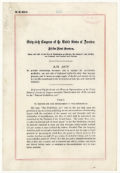

On October 28, 1919, the United States Senate voted 65 to 20 to override President Woodrow Wilson’s veto of the Volstead Act. Since the House had also voted to override the veto, America entered the Prohibition era.
The movement to prohibit alcoholic beverages had been underway for a century, led by the Women's Christian Temperance Union and the Anti-Saloon League. These groups formed a powerful single-issue coalition that relentlessly lobbied local, state, and federal governments. When the states began enacting laws to prohibit the manufacture and sale of intoxicating beverages, the temperance societies stepped up the pressure on Congress. In 1917 Congress sent the Eighteenth Amendment, known as the Prohibition Amendment, to the states with a seven-year deadline for passage—the first amendment to have a time restriction. Within 13 months, the states had ratified it.
The Eighteenth Amendment banned but did not define “intoxicating liquors.” Some of the members of Congress who had voted for the amendment assumed that it referred to hard liquor and would exempt beer and wine. But the head of the Anti-Saloon League drafted a tough enforcement act, which was then sponsored by the chairman of the House Judiciary Committee, Minnesota representative Andrew Volstead. The National Prohibition Act, better known as the Volstead Act, defined an intoxicating beverage as anything that contained more than one half of one percent alcohol. By contrast, Canadian prohibition laws set the limit at 2.5 percent. The Volstead Act made it illegal to “manufacture, sell, barter, transport, import, export, deliver, furnish, or possess” such beverages.
The Eighteenth Amendment provided that the “Congress and the several states” would have power to enforce Prohibition by legislation, but the sweeping Volstead Act left the states no room for local option or any other flexibility. Ironically, the law called for a vast increase in the federal government’s intervention in society just as “limited government” advocates were coming into office. Prohibition corresponded with the presidencies of Warren G. Harding, Calvin Coolidge, and Herbert Hoover, and with a parsimonious Congress that was reluctant to appropriate sufficient funds for effective enforcement of the Volstead Act.
The result was a decade of lawlessness, with citizens flouting the law at speakeasies and bootleggers corrupting public officials. On Capitol Hill, a rumrunner known as “The Man in the Green Hat” operated freely out of the Senate office building. By 1932, polls showed that the great majority of Americans believed that Prohibition had failed. The repeal of Prohibition became a popular campaign theme for Franklin D. Roosevelt, and the Twenty-First Amendment, which was approved soon after he swept into the presidency, finally nullified the misguided Volstead Act.
Information provided by the Senate Historical Office.